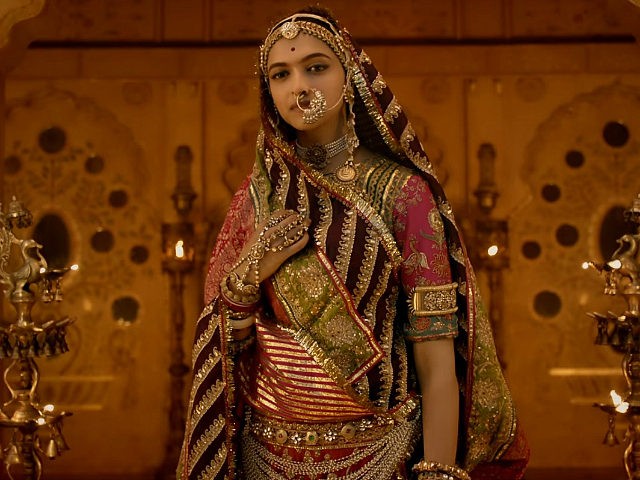A Bollywood film rumored to contain a romantic fantasy scene between a legendary Hindu queen and a Muslim conqueror opened to angry protests and vandalism on Thursday, even though the scene was not actually in the movie.
The movie Padmaavat concerns a most likely apocryphal act of defiance by the Hindu Queen Rani Padmini, also known as Queen Padmavati, a 14th Century ruler who was immortalized in a 16th Century poem by a Sufi writer. According to the poem, a Muslim Sultan named Alauddin Khilji became obsessed with tales of her beauty, marched an army up to the gates of her palace, and demanded to have a look at her.
This was against tradition at the time, and Padmavati’s family reasonably suspected that letting Alauddin meet her face-to-face would not make him any less obsessed, so they only permitted him to see her reflection in a mirror. Granted that it is easy to quarterback these things from a foreign land centuries later, but that just does not seem like a well-thought-out plan.
Alauddin lost his marbles when he saw Padmavati’s reflection and took her husband the king hostage, whereupon a much better plan was hatched, and the one hundred palanquins supposedly bearing Padmavati into the sultan’s clutches were instead turned into very comfortable Trojan horses full of soldiers.
The king was rescued, but Alauddin laid siege to the palace and overwhelmed its defenders. Queen Padmavati led the ladies of the palace in an act of mass suicide by throwing herself into a huge fire, singing as they died. Alauddin, who had aspirations to become the next Alexander the Great, ended up a broken man and was driven mad by his memories of the dying women’s screams.
Just about every detail of the legend is hotly debated, including whether Padmavati existed at all, so there would be no way to film it without controversy. Alauddin was a real person, but historians think he might have been more interested in the real estate he attacked than the beauty of its legendary queen. On the other hand, the poem has lush scenery, beautiful women, glowering men, sword fights, and singing, so it has Bollywood written all over it.
Among the criticisms of director Sanjay Leela Bhansali’s new film is that it makes Alauddin into a scruffy barbarian when neither history nor the fanciful epic poem describe him that way. Also, objections were raised that the movie trailer showed the queen dancing in public, a major historical inaccuracy.
The more severe criticism concerned persistent rumors that Queen Padmavati and Sultan Alauddin Khilji would share a romantic encounter in a dream sequence. This enraged some members of the Rajput tribe, the descendants of the people Queen Padmavati ruled seven hundred years ago.
Some of the criticisms they leveled were taken seriously by the filmmakers, such as complaints that some of the queen’s costumes were too revealing. Others turned out to be inaccurate—she does not dance in public in the film, and most importantly, there is no fantasy romantic encounter between her and the sultan. On the contrary, the movie works hard to portray Alauddin as a complete villain, as you can see in the trailer:
That did not stop a campaign of protest, sabotage, and threatened violence from dogging the film’s every step throughout production. At one point, a member of the ruling political party in India offered a reward equal to $1.5 million U.S. for the beheading of the director and the actress who plays the queen, Deepika Padukone. States governed by Hindu nationalists threatened to ban the movie, although the national Supreme Court ruled such bans illegal. Some theaters refused to show it because they were afraid of vandalism.
Those who saw the final cut of the film insist it contains nothing offensive, but that did not stop angry demonstrations featuring vandalized shops, flaming tires, and burning buses from sweeping India when it was formally released on Thursday. In a city not far from New Delhi, television cameras caught children huddling in terror as their school bus was attacked by protesters.
The timing was most inconvenient, as India is currently hosting a summit for Southeast Asian leaders and preparing for its Republic Day celebration. Some screenings were canceled, while others were given extra police security so they could proceed. The film’s opening has been delayed in some of India’s biggest markets, to the dismay of theater owners, since it’s a huge production that was expected to fill a lot of seats.
The protests were severe enough to close schools and cancel corporate meetings. Commuters were stranded for hours on clogged roads. Some companies advised their employees to work from home in the interests of safety. A group of 300 women petitioned the Indian government for permission to kill themselves over the movie. Another Hindu extremist said he was thinking about killing himself live on Facebook, but wanted to see how much the movie raked in at the box office first.
“We behave rather strangely for a country acclaimed as the world’s largest democracy. We ban books and films before even reading or seeing them,” sighed Aroon Purie of the Daily O in an editorial, alluding to the fact that few of the demonstrators claim to have actually seen Padmaavat.
“The fundamental problem is that we still think in terms of caste and community and how we can further our self-interest,” Purie wrote. “In a country beset with such serious problems as a slowing economy, crumbling infrastructure, suffocating pollution, ailing health care, and a pathetic education system, the national conversation is dominated by a mythical character. It doesn’t reflect well on us as a nation with claims to modernity and democracy.”

COMMENTS
Please let us know if you're having issues with commenting.